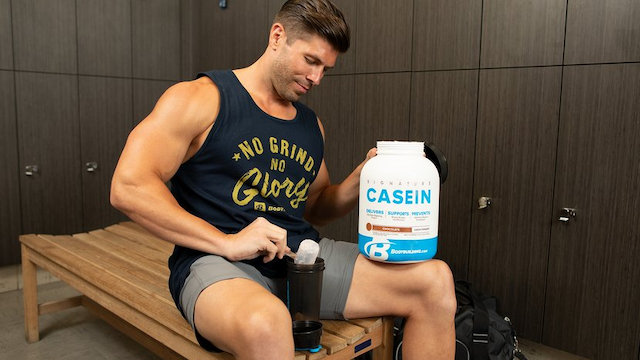Protein powders are a convenient and easy way to increase your protein consumption. However, with so many options on the market, determining which one is best for your health and fitness goals can be difficult. Nowadays, one of the most popular choices for muscle boost is a milk protein called casein. Most people consume casein through cow’s milk since it makes up around 80% of the total protein.

When it comes to its types, you can choose between micellar casein, the most common and slowest soluble type of casein produced by microfiltration, and hydrolysed casein, a form of pre-treated casein absorbed more quickly.
What Does Casein Do to Your Body?

Like all proteins, casein is a good amino acid supplier. Because it comes from an animal, it has a diverse amino acid profile and so contains all of the essential amino acids that the human body cannot produce. In terms of casein protein composition, 33 grams of powder typically includes 24 grams of protein, 3 grams of carbs, and 1 gram of fat. Due to its sluggish absorption rate in the stomach, casein is characterized as a “time-release” protein. This implies that it supplies amino acids to your cells at a low level over a lengthy period.
It can assist your cells in protein synthesis even when your body is breaking down its muscles to feed itself, such as when you haven’t eaten in a while. It’s also called “anti-catabolic” because it helps prevent muscle breakdown. Go ahead and try high-quality casein protein to give your body the nutritional benefits it needs.
Why Casein Is Better Than Whey?
The biggest advantage of whey protein is that it speeds up your gains. That’s because it takes only 20 minutes for your body to break it down and absorb it. As a result, your body will be able to restore and grow the muscle that was broken down throughout your workout more quickly.
Protein casein, like whey protein, supplies all of the key amino acids your body requires. Casein, in contrast to whey, is a “time-release” protein because it is digested more slowly. The absorption of amino acids and the formation or synthesis of proteins in your body peak 3 to 4 hours after you take it. Protein casein may be a better alternative depending on your fitness goals. It doesn’t raise amino acid levels as quickly or as well as whey protein. It does, however, slow down the rate at which proteins are broken down in the body. This protects your muscle mass and makes you feel full longer, which is great for preventing nighttime hunger.
Promotes Muscle Growth and Weight Loss

Casein has been the number one type of supplement for athletes and bodybuilders for decades. It contains all critical amino acids that your body is unable to manufacture spontaneously, very similar to other animal proteins. More importantly, it contains a lot of leucine, which helps kick-start muscle protein synthesis.
One study compared three groups of people. The first consumed casein protein, the second whey, while the third group consumed no protein. The researchers came to discover when compared to the placebo group, the casein group saw double the muscle gain and quadruple the fat loss. Additionally, the casein group lost more fat than the whey group. Nighttime casein helps to avoid protein breakdown, which can occur when you go without eating for an extended period.
Casein produces the gel in your stomach that provides a constant stream of amino acids to your muscles all night long, promoting muscular recovery and growth.
More Impressive Health Benefits
Consuming casein can improve your overall health because of its impressive benefits. Some cell research indicates that casein may have antibacterial and immune effects as well as lower blood pressure. This milk protein also lowers triglyceride levels by 22% after a meal. Peptides are an integral component of casein and some of them may act as antioxidants, preventing damaging free radicals from forming. People consuming this supplement are known to experience three times larger reduction of fat, compared to those who consume whey protein or no protein at all.
Casein and Its Side Effects
The misconception that consuming too much protein is bad for your health has been refuted numerous times. In healthy people, direct surveys and exams have shown that there are no harmful effects. The only exception is for people with kidney or liver disease who need to limit their protein intake. Casein is a common allergy because it is the main protein present in dairy. If you have a milk allergy, stay away from casein and whey protein powder, as well as any other meals or supplements that contain milk proteins. If you have a soy allergy, you should avoid casein protein powder because many casein products contain soy as an addition. If you’re lactose intolerant, casein powder is safe to take because most if not all of the lactose is removed during the production process.
Proper Consumption and Dosing

More and more people take proteins as a substitute rather than a supplement. This assumption leads to the conclusion that people lack general knowledge of the protein supplement dose, the body’s requirement, and when to take it. Casein can be consumed at any time of day and with any meal. It’s a slow-digesting vitamin that keeps us satisfied for a longer period. Casein can be taken with snacks when you want to go for long periods without eating a full or hefty meal. When taken a few hours before exercising, Casein ensures an appropriate supply of amino acids for the duration of the workout.
Whey, on the other hand, is a better option for a quick burst of energy before an exercise. Taking casein before bedtime aids in tissue recovery (strain, blots, and other blemishes caused by training mishaps) and muscle protein synthesis. Because the body’s metabolism is at rest when sleeping, it’s an excellent time to consume casein for slow and constant absorption of contained amino acids. If you want to lose weight, taking casein in between meals will keep you from overeating because you won’t be hungry and enticed to eat junk food.
The recommended daily dose for an athlete or a trainer who wants to shed body fat while maintaining lean muscle mass is 1.5 to 2.2 grams per kilogram. For those who are not looking to change their body composition, 0.8 to 1.0 grams per kilogram of body weight is enough.





















